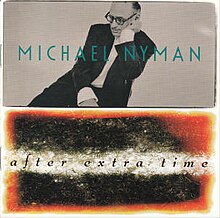Facing Goya (2000) is an opera in four acts by Michael Nyman on a libretto by Victoria Hardie. It is an expansion of their one-act opera called Vital Statistics from 1987, dealing with such subjects as physiognomy, eugenics, and its practitioners, and also incorporates a musical motif from Nyman's art song, "The Kiss", inspired by a Paul Richards painting. Nyman also considers the work thematically tied to his other works, The Man Who Mistook His Wife for a Hat, The Ogre, and Gattaca, though he does not quote any of these musically, save a very brief passage of the latter. It was premièred at the Auditorio de Galicia, Santiago de Compostela, Spain on 3 August 2000. The revision with the cast heard on the album premiered at the Badisches Staatstheater Karlsruhe, Germany, on October 19, 2002. Vital Statistics has been withdrawn. The Santiago version included more material from Vital Statistics. The opera was most recently performed at the 2014 Spoleto Festival USA, located in Charleston, South Carolina.
The Michael Nyman Band, formerly known as the Campiello Band, is a group formed as a street band for a 1976 production of Carlo Goldoni's 1756 play, Il Campiello directed by Bill Bryden at the Old Vic. The band did not wish to break up after the production ended, so its director, Michael Nyman, began composing music for the group to perform, beginning with "In Re Don Giovanni", written in 1977. Originally made up of old instruments such as rebecs, sackbuts and shawms alongside more modern instruments like the banjo and saxophone to produce as loud a sound as possible without amplification, it later switched to a fully amplified line-up of string quartet, double bass, clarinet, three saxophones, horn, trumpet, bass trombone, bass guitar, and piano. This lineup has been variously altered and augmented for some works.
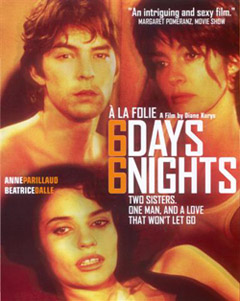
À la folie is a 1994 French drama film by Diane Kurys with music by Michael Nyman. It entered the competition at the 51st Venice International Film Festival.

The Michael Nyman Songbook is a collection of art songs by Michael Nyman based on texts by Paul Celan, Wolfgang Amadeus Mozart, William Shakespeare and Arthur Rimbaud. It was recorded as an album with Ute Lemper in 1991, and again as a concert film in 1992, under the direction of Volker Schlöndorff, again with Ute Lemper, though many of the musicians had changed. The songs have been recorded by others and as instrumentals, and are published by Chester Music. The album has been issued by both London Records and Argo Records, though the covers are the same except for the logo.

Live is a 1994 album by Michael Nyman and the Michael Nyman Band. It is Nyman's 24th release and the fifteenth with the Band. It is the first commercial live album by the band, which had previously performed live on the magazine release, 'The Masterwork' Award Winning Fish-Knife. It is also known as "The Upside-Down Violin", the only new composition on the album, and the working title, Breaking the Rules, made it into many computer sales systems. The album's cover and booklet were designed by Dave McKean. Liner notes are by David Toop. Early printings of the album cover listed the first three tracks erroneously as "Queen of the Night", "An Eye for Optical Theory", and "Chasing Sheep Is Best Left to Shepherds"

The Essential Michael Nyman Band is a studio album featuring a collection of music by Michael Nyman written for the films of Peter Greenaway and newly performed by the Michael Nyman Band. It is the seventeenth album release by Nyman. The album features liner notes by Annette Morreau, who describes the album as "a summation and digest of ten years of progress in the performance of music by a composer -- a composer with whom, so evidently, a group of friends and expert musicians intimately identify their total commitment, virtuosity, and joyous enthusiasm."
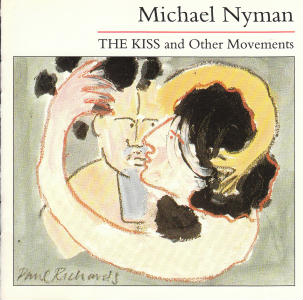
The Kiss and Other Movements is the sixth album release by Michael Nyman, and the fifth recording with the Michael Nyman Band. The title track is an "operatic duet" between Dagmar Krause and Omar Ebrahim, based on a painting of the same title by Paul Richards, which is depicted on the cover, and used in a video art project by Richards of the same name. The album includes music from Peter Greenaway's Making a Splash and 26 Bathrooms, an excerpt of Nyman's unfinished opera, Tristram Shandy, and a concert piece, "Tango Between the Lines".
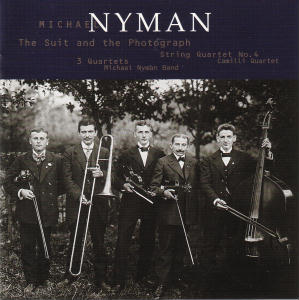
The Suit and the Photograph is a 1998 album by Michael Nyman with the Michael Nyman Band, recorded in 1995. On this album, Nyman is the composer, conductor, and producer, and wrote the liner notes. The album contains two works, String Quartet No. 4 and 3 Quartets. The album is named for its cover photograph by August Sander, which Nyman had associated with the Michael Nyman Band since its inception in 1977. He cites a description of the photograph by John Berger, in an essay of the same title, describing that the suits deform the working class rural men just enough to "undermine physical dignity." Both of the pieces on the album originated in Japan. It is Nyman's second release on EMI and his 33rd in general, but is not designated part of a series, as EMI had done with Concertos. Said Nyman of EMI, "I didn't excite them, and they didn't excite me." Nyman's only further releases on EMI would be the UK edition of Ravenous, featuring remixes by William Orbit, and The Actors, both film scores.

The Composer's Cut Series Vol. I: The Draughtsman's Contract is the 51st album by Michael Nyman, recorded in 2005 with the Michael Nyman Band and released in 2006. It is the first in an unprecedented series in which Nyman began rerecording some of his film music independently of the needs of film production, and the culmination and refinement of 23 years of performances of the work since the recording of the original 1982 recording of The Draughtsman's Contract.
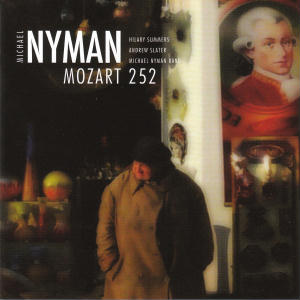
Mozart 252 is a 2008 album by Michael Nyman with the Michael Nyman Band, Hilary Summers, and Andrew Slater, celebrating the 250th anniversary of Wolfgang Amadeus Mozart's birth. Although "Revisiting the Don," one of only two newly written works on the album, was commissioned and performed in 2006, the album's title is a joke on its lateness as an album, released 252 years after Mozart's birth. The album also includes "In Re Don Giovanni," Nyman's first composition for the band, which is based on the first fifteen bars of "Madamina, il catalogo è questo" from Don Giovanni, six selections from Peter Greenaway's film, Drowning by Numbers, in which he was instructed to base the music on the slow movement of Mozart's Sinfonia Concertante K. 364, and two duets and an aria from Nyman's television opera, Letters, Riddles and Writs, in this recording featuring bass Andrew Slater as Leopold Mozart and contralto Hilary Summers as Wolfgang.
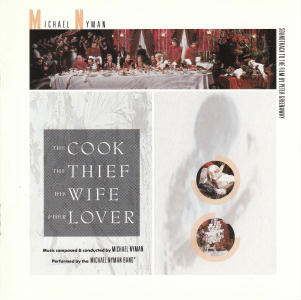
The Cook The Thief His Wife & Her Lover is the twelfth album release by Michael Nyman and the ninth to feature the Michael Nyman Band. It is the soundtrack to the eponymous film by Peter Greenaway. The album includes the first commercially released recording of Memorial, and this is the only piece discussed in the liner notes, to the point that the lyric sheet for "Miserere", the song which Pup the kitchen boy sings, is misidentified "Memorial." "Book Depository" is one of Nyman's many waltzes.

The Piano Concerto/MGV is the 23rd album by Michael Nyman, released in 1994. It contains two compositions, The Piano Concerto and MGV. The first is performed by Kathryn Stott and the Royal Liverpool Philharmonic Orchestra conducted by Michael Nyman, and the second is performed by the Michael Nyman Band and Orchestra with Michael Nyman at the piano.

The Composer's Cut Series Vol. III: The Piano is the third in a series of albums, all released on the same day, by Michael Nyman to feature concert versions of film scores, in this case, Jane Campion's The Piano, and his 53rd release overall. The collection is more streamlined and has fewer tracks than the soundtrack album, starting and ending with the popular "The Heart Asks Pleasure First."

Six Celan Songs • The Ballad of Kastriot Rexhepi is the 54th album released by Michael Nyman, who composed and conducted both the works on the album. The first, a setting of poetry by Paul Celan, was originally recorded by Ute Lemper and the Michael Nyman Band on The Michael Nyman Songbook in 1991, and here the band is joined by Hilary Summers. The Ballad of Kastriot Rexhepi is a new work created with the artist Mary Kelly. This is performed by the soprano Sarah Leonard with The Nyman Quartet: Gabrielle Lester, Catherine Thompson, Kate Musker and Tony Hinnigan.

Sangam: Michael Nyman Meets Indian Masters is the 46th album by Michael Nyman. It is a collaboration with musicians from India including U. Shrinivas and the Misra Brothers. It was released in 2003 and quickly cut out by its U.S. distributor. It was the last non-soundtrack Michael Nyman album to be released on any but his own label, MN Records, founded shortly thereafter. MN Records reissued the album in 2012.

24 Heures de la vie d'une femme is a 2002 film by Laurent Bouhnik, based on the 1927 novel 24 Stunden aus dem Leben einer Frau by Stefan Zweig. The music is by Michael Nyman, and the accompanying soundtrack album is his 45th.

8 Lust Songs: I Sonetti Lussuriosi is a setting by Michael Nyman of 8 pieces of a collection of erotic poetry from Pietro Aretino's I Sonetti Lussuriosi. The songs depict a man and woman's sexual desires for one another in varying contexts. Marie Angel premiered the piece, voicing both the male and female characters, including a voyeuristic old woman, with the Orchestra di Santa Cecilia, conducted by the composer, on 4 October 2007 at the Arsenale in Venice, Italy, on a commission from Venice Biennale. A studio recording with the Michael Nyman Band was released on compact disc 29 July 2008. It is Nyman's 59th album, and the twelfth on his own label.

The Composer's Cut Series Vol. II: Nyman/Greenaway Revisited is the second in a series of albums, all released on the same day, by Michael Nyman to feature concert versions of film scores, in this case, films of Peter Greenaway, and his 52nd release overall. The album is similar to The Essential Michael Nyman Band, although a number of tracks are on only one album or the other. In spite of being recorded in 1992, with the same lineup, Memorial is not the same performance as the one that appears on The Essential Michael Nyman Band or After Extra Time, which was recorded in Tokyo. This performance was recorded in London and is slightly less aggressively performed.

Wonderland is the 38th album release by British composer Michael Nyman and the soundtrack to the 1999 film Wonderland. It is the first of many collaborations of Nyman with director Michael Winterbottom. For Winterbottom, Nyman would later perform excerpts of this score in 9 Songs, provide a score for The Claim, and arrangements and re-used tracks for A Cock and Bull Story. Nyman's daughter, Molly, has continued the family working relationship with Winterbottom, scoring The Road to Guantanamo with Harry Escott.

La Sept is a 1989 promotional album of music for the French TV network La Sept written by Michael Nyman and performed by the Michael Nyman Band. It is Nyman's fourteenth release. Gabrielle Lester makes her debut with the band on this album. After a 13-year hiatus with the band, she would replace the departing Alexander Balanescu as concertmaster for The Michael Nyman Band during the recording of Facing Goya, and, as of 2008, remains in that position. Musical passages created for La Sept were later re-used for the piece The Final Score which is featured in the album After Extra Time.
